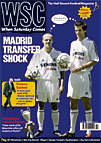 Paul Doyle hails Shelbourne's Champions League exploits
Paul Doyle hails Shelbourne's Champions League exploits
To get an idea of Shelbourne’s standing in Europe until recently, consider the sheer contempt with which Croatia’s Hajduk Split prepared for their crucial Champions League second-round clash with the League of Ireland winners. Victory would set up a glamour clash with the mighty Deportivo La Coruña and Hajduk were so convinced that honour would be theirs that Shels manager Pat Fenlon claimed his Croatian counterpart simply blanked him when the draw was made in Switzerland and instead went straight up to the Spanish team’s officials to make arrangements.
Though they only won the home leg 3-2 and claimed failure to qualify for the next round would spell financial disaster, Hajduk flew into Dublin just a few hours before the kick-off of the second leg and spent the pre-match warm-up scowling at the relatively shabby surrounds of Tolka Park, and firing the occasional shot at goal. Ninety minutes later, they looked a good deal less smug: with two superb goals, Shels had put an emphatic end to Split’s European dreams. And given free rein to their own. All that stood between them and a place in the lucrative group stages of the Champions League were one team: yes, Deportivo went all the way to the semi-finals last season, but just a few months after Greece had won Euro 2004, perhaps Shels could pull off the biggest shock in the competition’s history?
Well, that’s what many Irish people were saying. And the very fact they were talking positively of an Irish club shows how momentous Shelbourne’s achievement was. For years, most Irish football fans have regarded local clubs as embarrassing country cousins, not the sort of oafs you want representing the nation. It was much more respectable to just pretend Celtic or Manchester United were Irish.
They may have lost 3-0 on aggregate to Deportivo, but there is no doubt Shels have altered most people’s perception of the domestic league. They have banished the myth peddled by those who have never seen a local club game that the League of Ireland is little more than a moshfest. The truth is that Shels actually outplayed KR Reykjavik and Hajduk Split and persisted playing with poise and skill even when trailing in the Riazor.
The calibre of the players in the domestic game has never been so high. Shels took the decision two years ago to try to emulate city-rivals Bohemians by going fully professional. It was a massive financial risk: their annual wage-bill soared to €2 million (£1.35m), while gate receipts barely amount to €400,000, meaning the club’s charismatic and controversial general manager Ollie Byrne has had to constantly cajole an assortment of acquaintances and local business to help him make ends meet. What it also means, however, is that they have been able to attract players such as 29-year-old Alan Moore, who won eight Republic of Ireland caps with Middlesbrough, and Cameroon international Joseph Ndo. Fenlon has also been able to persuade Ireland Under-21 international Wes Hoolihan, who was outstanding in all the European ties, to stay in Dublin despite offers to join English clubs.
By going professional, Shels have, of course, also been able to improve their players’ fitness. Gone are the days when they would hold their own for 60 minutes before collapsing; now they have the stamina to go for the full 90. Indeed, they have scored half of their European goals so far this season in injury time.
Shels are not alone. This season Cork City, with a cluster of full-timers, became the first Irish side to get through two rounds of the Intertoto, notching a fine win in Malmo before losing narrowly to Nantes.
The 26,000 tickets for Shels’ home leg against Deportivo sold out within days and those for the upcoming UEFA Cup tie against Lille are expected to do likewise. Perhaps overcome by the new-found popularity of his team, Byrne also claimed recently that the Shels shop had sold 40,000 replica jerseys in four days. An exaggeration no doubt, but an understandable one from a man who has worked tirelessly for decades to get respect for the club and league he loves, and who knows he has finally achieved it.
From WSC 212 October 2004. What was happening this month